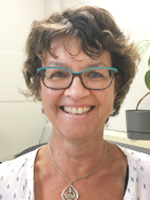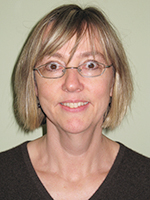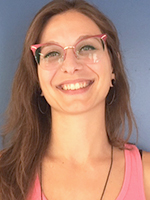
Congratulations to the 2018 Knowledge Translation Challenge award recipients!
Vancouver Coastal Health Research Institute (VCHRI) supports innovation and improvements in health care through its Knowledge Translation Challenge, a program run in collaboration with Providence Health Care. This competition encourages health care practitioners to improve patient care by translating evidence and research findings into practice. The Knowledge Translation Challenge facilitates innovative research projects that advance patient care by partnering practitioners with researchers who provide knowledge translation mentorship and resources.
These projects are made possible through a Providence Health Care and Vancouver Coastal Health Knowledge Translations Grant, funded in part by the Robert H.N. Ho Enhancing Patient Care Fund.
The team leads of the 2018 Knowledge Translation Challenge award winners are:
- Karen Anzai, rehabilitation consultant
- Eileen Cabrera, dietitian practice coordinator
- Barbara Crocker, public health dietitian
- Karina Czyzewski, Womxn’s Night Clinics coordinator
- Christine Yoneda, nurse educator
Improving self-management for persons living with spinal cord injuries

Project title: Piloting PODS (Patient Oriented Discharge Summary) on the Spinal Cord Program at GF Strong
Individuals living with spinal cord injury (SCI) must learn and understand a wealth of information in order to effectively manage their health. This is particularly vital after being discharged from a health facility. However, current discharge summaries are lengthy and full of medical jargon.
This project aims to increase the ability of individuals with SCI and their families to access and understand discharge instructions and care plans. The Patient-Oriented Discharge Summary (PODS) tool arms patients with five key pieces of information that they need to know in order to effectively manage their health after being discharged, including signs and symptoms to watch for, medication instructions and a schedule of their upcoming appointments.
“Transitioning from an inpatient setting to community living can be overwhelming, but PODS has been shown to be effective at increasing clients’ knowledge and confidence to self-manage their health,” says Anzai. “Implementing PODS into our service delivery could improve both health literacy and outcomes.”
Education to help identify and diagnose malnutrition

Project title: Tackling Malnutrition at Vancouver Acute (VA): Implementation of Subjective Global Assessment
Malnutrition can lead to extended hospital stays and increased costs to the health care system. The first step to better manage malnutrition is an accurate diagnosis.
“Dietitians are key health care professionals who identify malnutrition and provide nutrition care to patients,” says Cabrera.
This project aims to implement the use of the Subjective Global Assessment (SGA) tool, which can accurately diagnose malnutrition in patients who have been determined to be nutritionally at-risk. SGA is a simple, validated, bedside method of assessing malnutrition and identifying those who would benefit from advanced and specialized nutrition care. To implement the tool, the project team will identify SGA Trainers among the VA dietitians and develop a sustainable SGA Trainer program that includes education sessions and 1:1 mentoring for dietitians. The project also aims to raise awareness of malnutrition among hospital staff and the importance of addressing it.
Preventing infant iron deficiency

Project title: Iron deficiency in infants: a universal screening approach to assess for newborn risk factors
Iron is a key nutrient for the healthy growth and development of infants and children. Iron deficiency occurs when the body does not get enough iron, which can negatively affect the brain and the ability of an infant or child to learn. Early detection and treatment can prevent the long-term consequences of iron deficiency anemia in children, but symptoms can be so mild that they go unnoticed.
Using new practice guidelines, this project aims to create, implement and evaluate a universal screening approach to check for risk factors associated with iron deficiency among newborns. Screening results will be communicated to primary health care providers to ensure appropriate follow-up and treatment.
“The program is unique in that we will be working directly with newborns, their families and their doctors to promote health and prevent illness,” says Crocker. “By assessing the risk factors that may contribute to low iron stores and developing this screening approach, we will be in a better position to help parents, public health nurses and primary care providers prevent iron deficiency.”
Creating safe spaces for women of all orientations

Project title: Welcoming Womxn’s Nights
It has been shown that vulnerable populations can hesitate to seek health care services due to the fear of stigma and judgement from care providers, and uncomfortable male-dominated waiting rooms. This can be particularly true for Indigenous women, women who use drugs, sex workers and other marginalized women and gender-diverse individuals.
For this project, Womxn’s Night Clinics in Vancouver’s downtown eastside will be used as demonstration sites for a more equity-oriented care approach to support a culture of safety in primary care clinics for all womxn*.
The project will engage patients in Equity Walk-Throughs and photovoice to support changes to waiting rooms, and implement an equity-oriented education program for staff. The education program will instruct staff on providing more responsive care from an intersectional lens—which includes talking circles with Elders and e-learning modules focused on addressing health inequities and stigmatizing or problematic language—and on engendering feelings of safety for equity-seeking clients.
“We will be utilizing our Womxn’s Night Clinics as a starting point for staff and patients,” says Czyzewski. “We want to engage patients in assessing and re-envisioning our waiting rooms, and establish clinical champions in order to expand equity-oriented care beyond our clinics.”
*Womxn is an inclusive term for cisgender, transgender and gender-diverse women, along with anyone who feels safer in womxn-only spaces.
Informing patients about their rights

Project title: Rights under BC Mental Health Act
Project jointly funded by VCH and PHC
In March 2019 the Office of the Ombudsperson issued a report titled Committed to Change: Protecting the Rights of Involuntary Patients under the Mental Health Act that identified a lack of compliance in submitting the legal documentation required for involuntary admission to hospitals in BC.
“The findings of the Ombudsperson’s report show there is a knowledge gap, and we are hoping to address that,” says Yoneda.
For this project, researchers will create an online training module that will provide clinicians with more information about people’s rights under the BC Mental Health Act, as well as introduce them to other resources and tools available online at BC Mental Health Rights. This module will be designed to enhance clinicians’ ability to meet the requirements of the Mental Health Act and better understand the therapeutic benefits and clinical considerations involved in informing the people they serve about their rights under the Act.
“Creating and implementing this educational tool will help raise awareness about the Mental Health Act and inform clinicians about their responsibility to consistently provide those certified involuntarily under the BC Mental Health Act with information about their rights.”


